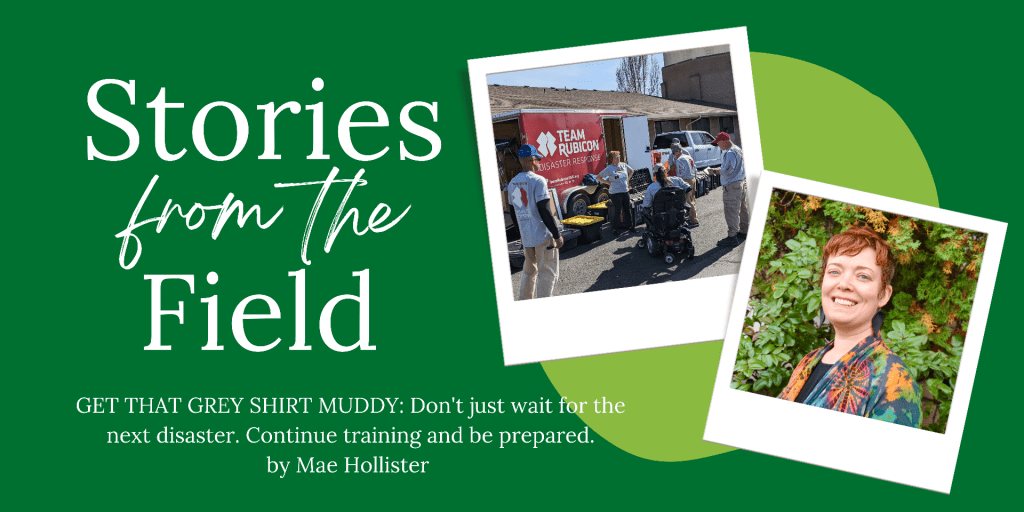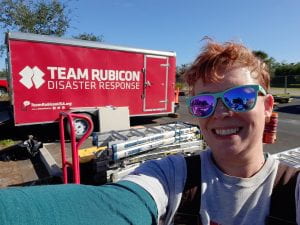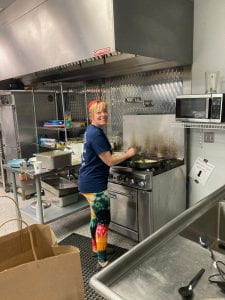by Mae Hollister, Disaster Program Manager, Archie Creek Fire Long Term Recovery Group, Douglas County & Glide Revitalization
While packing my Go Bag for a mitigation operation in Southern Oregon this week, I reflect upon the first time I packed my bag for Team Rubicon disaster response, the “Sunshine Strong” operation in Florida for hurricane Ian in December 2023. I put a lot of strategy into that first packing bag. That was my inaugural disaster response experience, and my inner gear and preparedness dorkreally came out. I checked the Team Rubicon recommended packing list three times, added my domain knowledge of backpacking/camping, living in developing countries, and my Southern Oregon country girl roots. I was so confident that I had thought of ALL the things.
I slept in my car in the Eugene airport parking lot the night before my flight to ensure that I wouldn’t have any weather issues coming from Sutherlin for my 5 a.m. departure, only to promptly run into flight delays having a domino effect across the country. I narrowly made it to my connecting city where I would now have to spend Christmas waiting for the next flight out to Tampa. After hours of tracking down my pack in the Denver airport, navigating mountains of luggage and mobs of angry holiday travelers, I was getting a sinking feeling that the airline meltdown was going to be the only disaster deployment I would experience. As I stepped outside into below freezing temps and a fierce wind to await a local friend who graciously was rescuing me from the frontlines, I quickly realized that my Go Bag packing analysis had not accounted for Denver weather!
I got a hotel room, regrouped, borrowed a winter jacket, and trudged out in my work boots to a steakhouse with my friend, determined to salvage Christmas at a minimum. Amazingly I was able to catch the first flight out the next day, made it to Tampa and found some Team Rubicon Greyshirts at the rally point in the airport. I was greatly relieved that they were there to meet me despite all the changes and travel chaos. My arrival at the FOB (forward operating base) felt like I had landed in a foreign country speaking a different language. The logistics and processes were mind boggling! Did you sign the 211? Nope, what is that? A sign-in and sign-out sheet… Um, why can’t we just call it that? Do you know what strike team you are on and who is your leader? Negative, nobody told me. It is on the 204s, check them to see which team you have been assigned to. Did your strike team lead give the safety talk to you swampers? Um… still figuring out who my lead is and what exactly is a Swamper… that doesn’t sound like a fun term… wait, I’m a Swamper on this team!? Don’t forget to be at breakfast and dinner in time for the debriefs. What time are those? Meetings are part of the Battle Rhythm, check the sign… Argh, what is a Battle Rhythm!? Where is the sign? There is usually one outside the mess tent and the C&G trailer… alright, I identified the “food” tent, as I will always know where to get snacks… and I will just assume the other is something to do with “command.”
Thankfully there were several seasoned Greyshirts that helped translate this new world for me! We had a few days in the field and then were informed that this FOB was demobilizing, another term I had no idea what all it involved. I now can attest that taking inventory of equipment and supplies after a 3 month response operation is an operation in and of itself! Evenings were spent around the fire pit at “beer flag,” sipping our two allowed beverages and swapping TR stories. C&G (command and general staff) arranged for us to have some trainings at the end of the week, in which I learned all about the Reconnaissance and Advanced Onsite stages of mission planning and the Site Survey process for vetting and prioritizing work orders. A highlight was a night out at the local VFW Hall (veterans of foreign wars) with karaoke and several patrons coming up to me thanking Team Rubicon for our work, expressing how they would have been at a loss these past few months without Greyshirts helping clean up the damage to their homes and property. TR treated us to a dinner out on a beach for New Year’s Eve, complete with seafood, fireworks and a glorious sunset. By the time I boarded my flight home on New Year’s Day, I felt that I had not only learned a new language and helped people in need, I had found a new TRribe.
Fast forward four months and I am now weaving my Team Rubicon service into my RARE service. After attending TR’s Pacific Northwest Leadership conference, I stepped up to be a membership leader in my Southwest Oregon region. I am building our bench of Greyshirts to help with regional wildfire mitigation operations. Through my RARE service I have identified a huge need for boots on the ground to do fuels reduction and defensible space mitigation work – Team Rubicon is built for this! In mid-April I served as Deputy Logistics on the C&G team for the Two Knights Defense Operation in Josephine County, which was a homeowner and parks mitigation pilot in the Grants Pass and Merlin areas. Not only did I learn all about planning and running a mitigation operation, I also got great insight into the community liaison and outreach needs to do a similar project in Douglas County, my homeland and RARE hosting community.
One of Team Rubicon’s cultural principles is “GSD – Get Sh** Done.”. Supported by the mantra of “I looked at the divide and built a bridge.” This TRibe attitude goes hand in hand with RARE’s “Get Stuff Done” motto! I am on a mission to bring the two together for a mitigation operation on the North Umpqua in eastern Douglas County. When a grant opportunity cameabout for exactly this, I immediately set about building bridges. I coordinated a multi-agency collaboration with the Archie Creek Fire Long Term Recovery Group, Glide Revitalization, Douglas Forest Protection Association, and Glide Rural Fire Protection District to seek funding from the Oregon State Fire Marshal Community Wildfire Risk Reduction Grant.
The future Umpqua Fire-adapted Landscapes and Safe Homes (FLASH) assistance program is being designed to help create defensible space around homes and property across Douglas County. Mitigation work orders and volunteer workforce crews will be prioritized to serve higher risk Douglas County residents, such as seniors, alter-able, veteran, and/or low-income residents unable to perform the work without assistance. All mitigation assistance will be provided at no cost to property owners. Program activities and offerings will include: Home Ignition Zone (HIZ) assessments and education, vegetation mitigation to create defensible space around homes, and volunteer operations in collaboration with Team Rubicon and the Northwest Youth Corps.
It is hard to believe that it has only been four months since my Team Rubicon journey began, and I am now laying the groundwork to incorporate this dedicated organization into my RARE projects and GSD in my own backyard! In my second year as a RARE member, I have found this work to be the most fulfilling of my career. As a third generation Umpqua Valley local, wildfire mitigation and building a fire adapted landscape to protect my homeland is near and dear to my heart. I feel blessed to have this opportunity!
 About the author, Mae Hollister: Originally from Umpqua, Oregon, and a first generation college student, Mae obtained her Bachelor of Arts in International Studies from the University of Oregon in 2004 with a focus on Cross-Cultural Communications and Latin America. After a series of apprenticeships in the fields of politics, business, government, and nonprofit, she fell into the world of small business and nonprofit start-ups and went on to complete a Masters in Sustainable Business Management at Marylhurst University in 2012. Mae wears the hats of Business Analyst, Team Rubicon Metro Leader, Digital Nomad and Servant Leader, with more than 15 years of experience successfully leading mission-driven initiatives and teams. Passionate about servant leadership and on her third round of AmeriCorps service, Mae is looking to bring together her organizational business expertise and passion for community resiliency to pivot her career into the field of disaster preparedness, response, and recovery.
About the author, Mae Hollister: Originally from Umpqua, Oregon, and a first generation college student, Mae obtained her Bachelor of Arts in International Studies from the University of Oregon in 2004 with a focus on Cross-Cultural Communications and Latin America. After a series of apprenticeships in the fields of politics, business, government, and nonprofit, she fell into the world of small business and nonprofit start-ups and went on to complete a Masters in Sustainable Business Management at Marylhurst University in 2012. Mae wears the hats of Business Analyst, Team Rubicon Metro Leader, Digital Nomad and Servant Leader, with more than 15 years of experience successfully leading mission-driven initiatives and teams. Passionate about servant leadership and on her third round of AmeriCorps service, Mae is looking to bring together her organizational business expertise and passion for community resiliency to pivot her career into the field of disaster preparedness, response, and recovery.
Interested in gaining environmental and sustainability planning experience of your own? Are you looking for a life changing experience in rural Oregon? Learn more about serving with the RARE AmeriCorps Program. Applications for Year 30 (2023-24) due April 30, 2023 by 11:59pm PDT.





Bravo, on so many levels! Great work, and a wonderful, informative read! Thank you for being involved in the work that benefits our community!